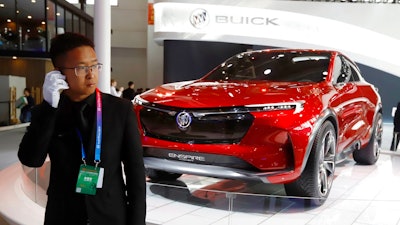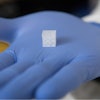
BEIJING (AP) — Volkswagen and Nissan have unveiled electric cars designed for China at a Beijing auto show that highlights the growing importance of Chinese buyers for a technology seen as a key part of the global industry's future.
General Motors displayed five all-electric models Wednesday including a concept Buick SUV it says can go 600 kilometers (375 miles) on one charge. Ford and other brands showed off some of the dozens of electric SUVs, sedans and other models they say are planned for China.
Auto China 2018, the industry's biggest sales event this year, is overshadowed by mounting trade tensions between Beijing and U.S. President Donald Trump, who has threatened to hike tariffs on Chinese goods including automobiles in a dispute over technology policy.
The impact on automakers should be small, according to industry analysts, because exports amount to only a few thousand vehicles a year. Those include a GM SUV, the Envision, and Volvo Cars sedans made in China for export to the United States.
China accounted for half of last year's global electric car sales, boosted by subsidies and other prodding from communist leaders who want to make their country a center for the emerging technology.
"The Chinese market is key for the international auto industry and it is key to our success," VW CEO Herbert Diess said on Tuesday.
Volkswagen unveiled the E20X, an SUV that is the first model for SOL, an electric brand launched by the German automaker with a Chinese partner. The E20X, promising a 300-kilometer (185-mile) range on one charge, is aimed at the Chinese market's bargain-priced tiers, where demand is strongest.
GM, Ford, Daimler AG's Mercedes unit and other automakers also have announced ventures with local partners to develop models for China that deliver more range at lower prices.
On Wednesday, Nissan Motor Co. presented its Sylphy Zero Emission, which it said can go 338 kilometers (210 miles) on a charge. The Sylphy is based on Nissan's Leaf, a version of which is available in China but has sold poorly due to its relatively high price.
Automakers say they expect electrics to account for 35 to over 50 percent of their China sales by 2025.
First-quarter sales of electrics and gasoline-electric hybrids rose 154 percent over a year earlier to 143,000 units, according to the China Association of Automobile Manufacturers. That compares with sales of just under 200,000 for all of last year in the United States, the No. 2 market.
That trend has been propelled by the ruling Communist Party's support for the technology. The party is shifting the financial burden to automakers with sales quotas that take effect next year and require them to earn credits by selling electrics or buy them from competitors.
That increases pressure to transform electrics into a mainstream product that competes on price and features.
Automakers also displayed dozens of gasoline-powered models from compact sedans to luxurious SUVs. Their popularity is paying for development of electrics, which aren't expected to become profitable for most producers until sometime in the next decade.
China's total sales of SUVs, sedans and minivans reached 24.7 million units last year, compared with 17.2 million for the United States.
SUVs are the industry's cash cow. First-quarter sales rose 11.3 percent over a year earlier to 2.6 million, or almost 45 percent of total auto sales, according to the China Association of Automobile Manufacturers.
On Wednesday, Ford displayed its Mondeo Energi plug-in hybrid, its first electric model for China, which went on sale in March. Plans call for Ford and its luxury unit, Lincoln, to release 15 new electrified vehicles by 2025.
GM plans to launch 10 electrics or hybrids in China from through 2020.
VW is due to launch 15 electrics and hybrids in the next two to three years as part of a 10 billion euro ($12 billion) development plan announced in November.
Nissan says it will roll out 20 electrified models in China over the next five years.
New but fast-growing Chinese auto trail global rivals in traditional gasoline technology but industry analysts say the top Chinese brands are catching up in electrics, a market with no entrenched leaders.
BYD Auto, the biggest global electric brand by number sold, debuted two hybrid SUVs and an electric concept car.
The company, which manufactures electric buses at a California factory and exports battery-powered taxis to Europe, also displayed nine other hybrid and plug-in electric models.
Chery Automobile Co. showed a lineup that included two electric sedans, an SUV and a hatchback, all promising 250 to 400 kilometers (150 to 250 miles) on a charge. They include futuristic features such as internet-linked navigation and smartphone-style dashboard displays.
"Our focus is not just an EV that runs. It is excellent performance," Chery CEO Chen Anning said in an interview ahead of the show.
Electrics are likely to play a leading role as Chery develops plans announced last year to expand to Western Europe, said Chen. He said the company has yet to decide on a timeline.
Chery was China's biggest auto exporter last year, selling 108,000 gasoline-powered vehicles abroad, though mostly in developing markets such as Russia and Egypt.
"We do have a clear intention to bring an EV product as one of our initial offerings" in Europe, Chen said.






















